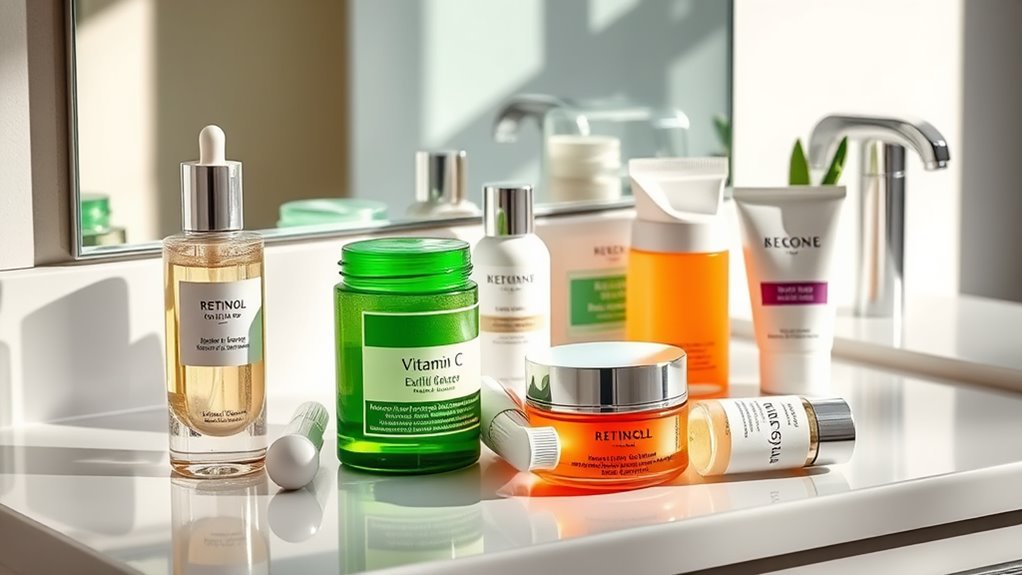7 Common Skincare Ingredients That Don’t Belong Together
When it comes to skincare, knowing what to combine can make or break your routine. Mixing retinol and vitamin C can lead to irritation, while combining AHAs and BHAs may heighten sensitivity. Understanding these interactions is crucial, especially if you’re trying to achieve healthy skin. Curious about other combinations to avoid? Let’s explore the ingredients that shouldn’t be used together for optimal results.
Retinol and Vitamin C
Combining retinol and vitamin C can lead to irritation rather than the desired skin benefits.
These skincare combinations can destabilize each ingredient’s effectiveness, causing redness and peeling.
Retinol’s exfoliating properties don’t pair well with vitamin C’s acidity.
To maximize results, consider alternating their application—using vitamin C in the morning and retinol at night.
This way, you can enjoy their individual benefits without causing harm. Additionally, using retinol alongside a natural alternative like bakuchiol can enhance skin rejuvenation without the irritation often associated with retinol.
AHAs and BHAs
Using AHAs (alpha hydroxy acids) and BHAs (beta hydroxy acids) together can lead to increased irritation and sensitivity in your skin.
Here are three key points to consider:
-
pH Levels: Both acids have different optimal pH levels, potentially destabilizing formulations.
-
Skin Barrier: Combined use can compromise your skin barrier.
-
Over-exfoliation: Increased risk of irritation makes your skin react negatively.
Benzoyl Peroxide and Retinol
Though both benzoyl peroxide and retinol are effective for treating acne, applying them together can cause significant irritation and dryness.
Benzoyl peroxide’s powerful antibacterial properties can destabilize retinol, reducing its efficacy. Additionally, combining them may lead to increased skin sensitivity.
For best results, use these ingredients at different times—benzoyl peroxide in the morning and retinol at night—to prevent these adverse effects.
Niacinamide and Vitamin C
While many people seek to enhance their skincare routine with potent ingredients like niacinamide and vitamin C, combining them can lead to complications.
Here are three reasons to keep them separate:
-
pH Levels: Vitamin C requires a lower pH to be effective.
-
Stability Issues: Mixing can destabilize these ingredients.
-
Skin Irritation: They may cause irritation if used together.
Consider using them at different times.
Salicylic Acid and Alcohol
Because both salicylic acid and alcohol have drying properties, combining them can exacerbate skin irritation and compromise your skin barrier.
This cocktail can lead to redness, peeling, and heightened sensitivity.
If you’re targeting acne, it’s better to choose one active ingredient at a time.
Prioritize a gentle skincare routine to maintain hydration and support your skin’s overall health and resilience.
Exfoliants and Acne Treatments
When you combine exfoliants and acne treatments, you risk overwhelming your skin. This can lead to irritation, dryness, or increased sensitivity.
Here are three reasons to avoid this combination:
-
Increased irritation: Both can strip your skin barrier.
-
Flaking skin: Over-exfoliation can cause excessive dryness.
-
Impaired healing: Acne treatments need a stable environment to work effectively. Additionally, over-exfoliation can contribute to worsening skin conditions, leading to a cycle of irritation and breakouts.
Essential Oils and Sensitive Skin
Do you know how essential oils can affect sensitive skin?
These concentrated extracts, while often praised for their benefits, can trigger irritation or allergic reactions in sensitive individuals. Oils like tea tree or eucalyptus may exacerbate inflammation, leading to redness or discomfort. It’s crucial to patch-test and dilute essential oils before use to minimize adverse effects on delicate skin. Additionally, certain essential oils have skincare benefits that can be advantageous when properly used for individuals with robust skin types.

